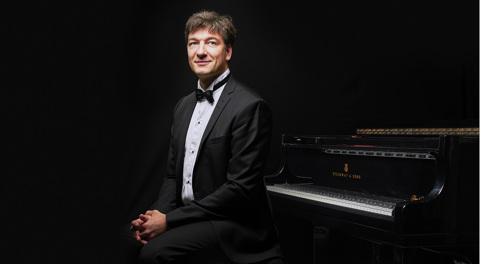READ THE BLOG
Byline: Megan Steller
Konstantin Shamray is having a busy week. When we chat, he has just finished performing with the acclaimed countertenor Aryeh Nussbaum Cohen for the Adelaide Festival, and is moments away from flying to Queensland for a solo performance of Liszt, Rachmaninov, and Ravel. “It has been hectic,” he laughs when I ask him how he has fared over the last ten days. “I’ve been teaching at the [Adelaide] Conservatorium, too, scheduling students around my rehearsals, but I always say to myself that busy is better than not busy! Last year was a great reminder of that.”
It is a sombre moment thinking about the challenges performers faced in 2020, and the ripple effect that those challenges have had on the industry at large. “I cannot complain about last year,” Shamray reflects, “so many lost their jobs, and I was so fortunate to be working as a teacher. I did a few online performances, and once Adelaide began to return in September, I was able to perform with the Adelaide Symphony Orchestra.” I wondered how he worked during the quiet period though, because without a definite performance on the horizon, I imagine it must have been difficult to stay driven and positive:
“I invested in my future, to the best of my abilities: practising, learning repertoire. I tried to use the time to do a lot of paced practice; staying active and working on exercises that you never get the time to do when you’re frantically preparing for performances!”
He wasn’t just churning through his Czerny though; Shamray also learned some new concertos that he hasn’t yet had the opportunity to perform. “I learned the Prokofiev Concertos that I didn’t know, so I have a full set now,” he chuckles. “Maybe I’ll get to play them soon!”
When Shamray was young, he spent his time going in and out of the local Philharmonic building in the city of Kemerovo, in southwest Siberia, Russia. His father, a concert pianist who worked consistently with the orchestra, brought Shamray in regularly, where the young prodigy was allowed to walk around behind the scenes and get to know his father’s colleagues. His first concert in front of an orchestra was with this orchestra; Shamray was just 10 years old, and the repertoire was Beethoven’s famous 2nd Piano Concerto.
“It’s my favourite concerto,” he says, “and the experience was unlike anything I’d felt before: I felt like I was not only responsible for myself, but for everybody, but those musicians were giving me this hugely warm feeling of support.” He has loved playing with orchestras ever since.

